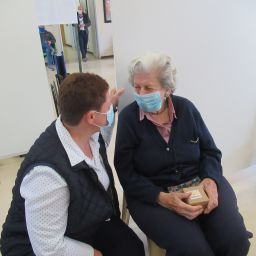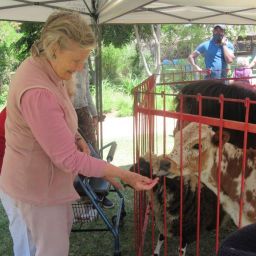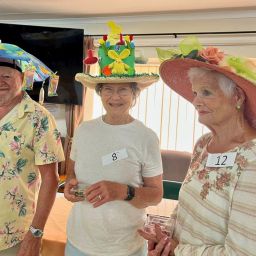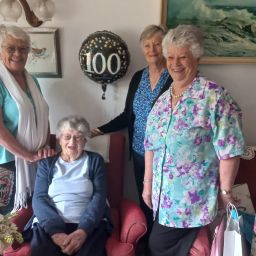When Rand Aid Association was formed in 1903, it gave assistance to the destitute, the aged and to men left jobless by the Anglo-Boer War. In 1929, it again stepped up to support people hard hit by the global financial crisis and depression of 1929. Today, that ethos of caring remains firmly entrenched in the non-profit organisation.
Rand Aid – which runs four independent-living retirement villages, two care centres for older persons and a rehabilitation centre for men battling substance abuse – has gone above and beyond to assist staff members and the wider community during the coronavirus pandemic.
“It is really heart-warming to know what Rand Aid is doing over and above its normal welfare mandate,” says Graham Brokenshire, a resident of Rand Aid’s Inyoni Creek retirement village, who is also one of two village representatives on the Rand Aid board of management.
Many people have lost their jobs as a result of the national lockdown and this has impacted a number of Rand Aid’s over 400 staff members, whose spouses or adult children are suddenly unable to contribute to the household income. “Many of these families are on the breadline,” says Rand Aid CEO Peter Quinn.
As a caring employer, Rand Aid is presenting food vouchers to lower-salaried employees, to be redeemed at Shoprite Checkers stores. The vouchers will be given out for three months, after which the situation will be re-assessed.
“We hope this helps put nutritious food on the table and ensures the immune systems of our more vulnerable employees and their families are not compromised,” says Peter.In addition, to lessen the risk of exposure to the virus on public transport, employees were given the option to be accommodated at the various Rand Aid properties. Sixty employees opted to say on site. These staff members receive three meals a day and have their laundry done.
“Our employees are very aware that they are at risk as they travel to work and back home on taxis. In addition, many live in densely populated areas where social distancing is difficult to maintain,” says Peter.
Winnie Mapekula, who is the receptionist at Rand Aid’s head office in Lyndhurst and who has been an employee since 2006, took up the accommodation offer from the start of the lockdown.
“Not only am I saving on transports costs, but have avoided the risks I would have been exposed to by using public transport,” she says.
Ordinarily, Winnie leaves home at 5am and arrives at work after 7am. She takes two taxis to travel from her home in Kagiso, situated in the Krugersdorp area west of Johannesburg, to work.
“Most people in my neighbourhood did not go to work in March, April and May because of the lockdown. However, given the nature of the work Rand Aid does, my work was considered essential. I would have been one of the few people on the streets at that time of the morning, and the thought scared me,” she says.
“Our accommodation at Rand Aid is comfortable and warm – everything is taken care of. Without have to face the stress of the commute during the pandemic, I have been able to focus better on my job and know that my risk of catching the virus is considerably reduced,” Winne adds.
Another staff member who chose to stay at Rand Aid is Emily Tshabalala, who lives in Tembisa. She says because of Rand Aid’s gesture, she is not having to wake up at 4am to get to work on time so she is well rested.
“Above all, I don’t have to worry about taking the coronavirus home,” she says.
Matron Avril Maltman, senior nursing manager at Rand Aid, says that since the start of the lockdown, absenteeism has been minimal. “Our staff members are extremely dedicated to their residents and their work. Many have chosen the safety of staying over despite being separated from their families.”
With schools being reopened on a phased-in basis, Rand Aid’s Wedge Gardens Treatment Centre hopes to resume the soup kitchen it runs at a local school, which has a high number of less fortunate students.
“The people undergoing rehabilitation for substance abuse at Wedge Gardens prepare the soup and then a Rand Aid driver takes it to the school. The project benefits hungry learners while also enabling our patients to take part in a meaningful activity that gives them a sense of purpose. This supports the rehabilitation process,” says Wedge Gardens manager Adèl Grobbelaar.
Woolworths donates some of the ingredients for the soup and around 160 learners are fed.
Another outreach, led by residents of Inyoni Creek, saw food parcels being handed over to the elderly women who are part of the Zamokuhle outreach programme run by Rand Aid’s Thembalami Care Centre. Ordinarily, these Alexandra women go to Thembalami three days a week, enjoying their meals there and taking part in social and recreational activities like knitting, crocheting and exercising.
Since the lockdown, the women have been unable to visit Thembalami and without the meals they get there, have been finding the going tough. Many of these women look after their grandchildren and battle to survive on their government grants.
The food parcels consisted of basic vegetables, samp, coffee, tea, sugar, tinned fish, baked beans, maize meal, oil and oats. They were gratefully received by the 23 beneficiaries.
In addition, Thembalami reached out to Alexandra-based non-profit company Rays of Hope to request additional food support for their Zamokuhle beneficiaries and 28 women received food parcels as a result.
“We hope to expand the food assistance initiative to the gogos and will see about getting our retirement village residents involved. Rather than having them buy non-perishable food – which would necessitate a trip to a store, we will arrange for electronic cash donations and make a bulk purchase,” says Peter.

















